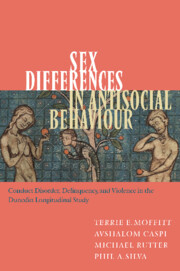 Sex Differences in Antisocial Behaviour
Sex Differences in Antisocial Behaviour Published online by Cambridge University Press: 22 September 2009
This chapter reports a comparison of Dunedin Study males and females who exhibited childhood-onset versus adolescent-onset antisocial behaviour. We tested whether childhood-onset delinquents had childhoods of inadequate parenting, neurocognitive problems, and temperament and behaviour problems, whereas adolescent-onset delinquents did not have these pathological backgrounds. We also queried whether females as well as males showed this differential pattern of risk, asking whether childhood-onset females had high-risk backgrounds, but adolescent-onset females did not. Finally, we ask whether Dunedin Study members on the life-course persistent antisocial path had more problem outcomes as young adults compared to those on the adolescence-limited delinquent path.
Between 1985 and 1988, when the members of the Dunedin Study grew from age 13 to age 15, we observed that many Study members who had not shown antisocial behaviour problems began to take up delinquent activities as they made the transition from childhood to adolescence. Our first descriptive report of this phenomenon contrasted those adolescent-onset delinquents with their counterparts who had been showing antisocial behaviour problems since early childhood (Moffitt, 1990b). We reported that childhood-onset delinquents were characterized by abnormal levels of individual and contextual risk factors (hyperactivity, low IQ and family adversity, among others) whereas adolescent-onset delinquents were not. The adolescent-onset delinquents' backgrounds were not inordinately healthy, but they were not pathological either; they were simply average.
To save this book to your Kindle, first ensure [email protected] is added to your Approved Personal Document E-mail List under your Personal Document Settings on the Manage Your Content and Devices page of your Amazon account. Then enter the ‘name’ part of your Kindle email address below. Find out more about saving to your Kindle.
Note you can select to save to either the @free.kindle.com or @kindle.com variations. ‘@free.kindle.com’ emails are free but can only be saved to your device when it is connected to wi-fi. ‘@kindle.com’ emails can be delivered even when you are not connected to wi-fi, but note that service fees apply.
Find out more about the Kindle Personal Document Service.
To save content items to your account, please confirm that you agree to abide by our usage policies. If this is the first time you use this feature, you will be asked to authorise Cambridge Core to connect with your account. Find out more about saving content to Dropbox.
To save content items to your account, please confirm that you agree to abide by our usage policies. If this is the first time you use this feature, you will be asked to authorise Cambridge Core to connect with your account. Find out more about saving content to Google Drive.